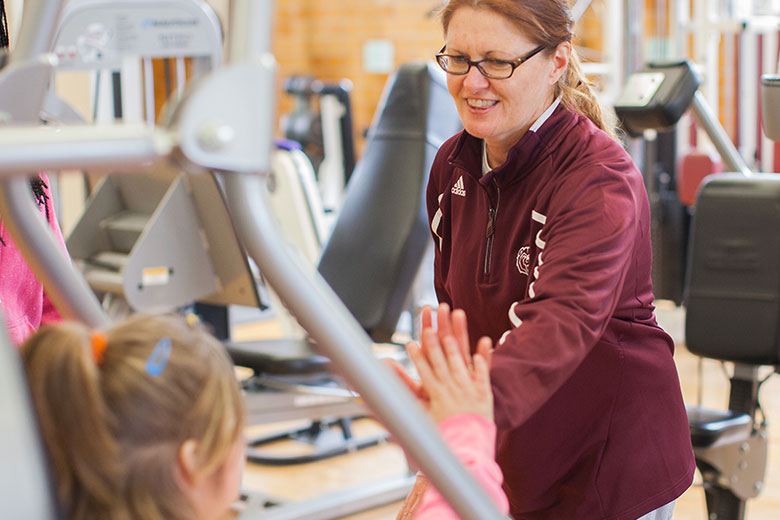Training the next Olympians
“People with intellectual disabilities often stick to the same things because they’re familiar; it’s part of their routine. TRAIN helps them to identify sports that they might be good at in Special Olympics, something new to try, based on their skill sets and abilities,” said Natalie Allen, dietetics instructor and dietitian for Missouri State athletics. “I think that’s one of the neatest things about it. It helps people to branch out and tells them you might be really good at bowling, swimming or basketball, why don’t you give that a try?”
At Special Olympics games or recreational events for individuals with intellectual disabilities (like the ones hosted by Arc of the Ozarks), TRAIN is offered to test abilities and introduce healthy eating and hydrating habits. It takes many groups of people to make it successful: exercise and movement science majors and physical education majors run the stations and often complete the physical activity (shuttle run or sit and reach for example) stations with the participant to make sure they understand what is expected; special education students escort and assist the athletes throughout the activities; dietetics students provide information on healthy eating and drinking habits (explaining what food would build muscle or provide energy). Computer science students designed the software that is used, while graphic design students designed the resource materials.
“To get a full profile, we take the data on the form and their assessments from the stations. Then it’s all entered into SNAPPER, the software program, and it prints out their areas of strength,” said Dr. Tamara Arthaud, head of the counseling, leadership and special education department at Missouri State.

“It’s wonderful. Students who have limited touch points with people with intellectual disabilities get to see them in their own culture. They get so see how they live life, and how they interact with friends.” — Dr. Rebecca Woodard
TRAIN is based on an assessment previously designed and administered by the Special Olympics called SHIP, which was very medically driven, according to Arthaud. Missouri State Alum Dave Lennox, vice president for leadership development and education at Special Olympics, Inc., recruited interns from Missouri State who then developed an assessment protocol called FIT, which later was revised into what TRAIN is today.
“This project was picked up by the Finish Line, and they provide all the materials for free,” added Arthaud. “Anyone who wants to do a TRAIN event in their community can contact the Special Olympics, and they will send them a kit with all of the information and all the materials needed. It’s nationwide now because the Finish Line is supporting it, and we are extremely proud that all of these materials were designed by interns from Missouri State.”
A winning experience for all
Everyone agrees the experience is a win-win for the faculty, students and participants. Dr. Rebecca Woodard, professor of kinesiology, requires TRAIN participation in many of her courses as her students need hands-on experience with adapted physical activity. In addition to that experience, though, she sees the interaction as a way of expanding students’ perspectives.
“It’s wonderful. Students who have limited touch points with people with intellectual disabilities get to see them in their own culture. They get so see how they live life, and how they interact with friends,” she said.

